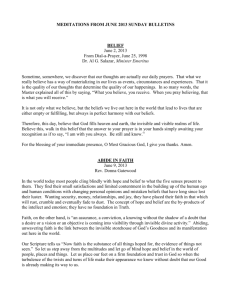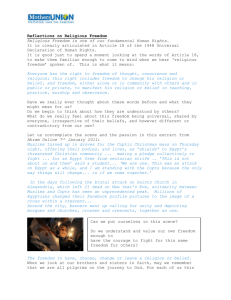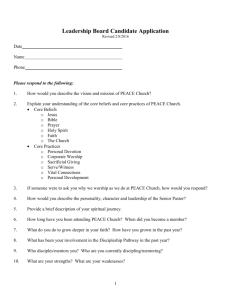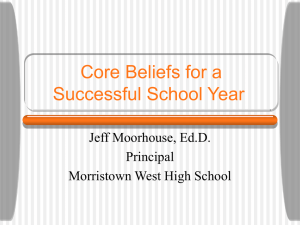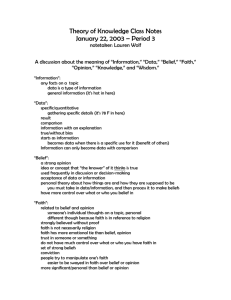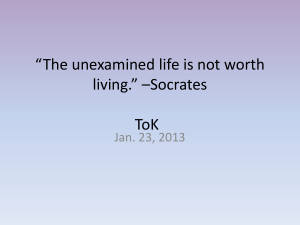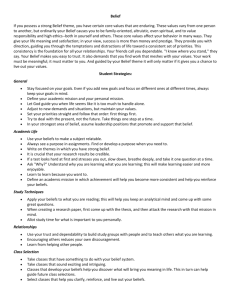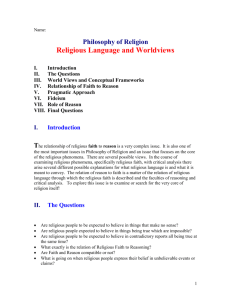religion tok
advertisement
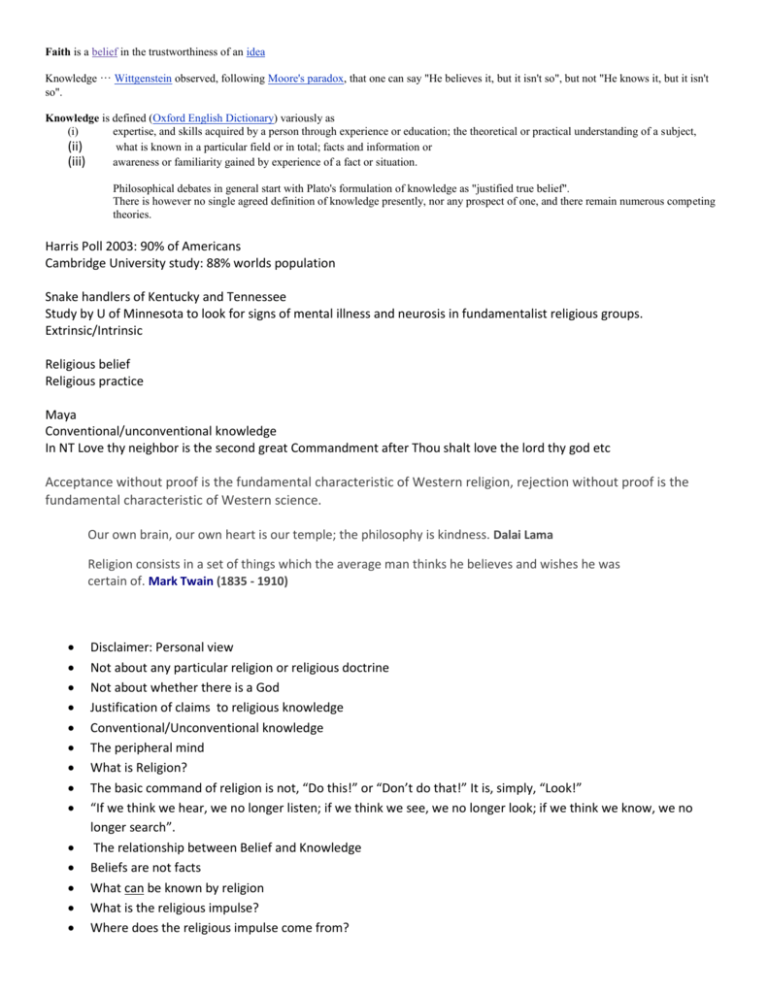
Faith is a belief in the trustworthiness of an idea Knowledge … Wittgenstein observed, following Moore's paradox, that one can say "He believes it, but it isn't so", but not "He knows it, but it isn't so". Knowledge is defined (Oxford English Dictionary) variously as (i) expertise, and skills acquired by a person through experience or education; the theoretical or practical understanding of a subject, (ii) what is known in a particular field or in total; facts and information or (iii) awareness or familiarity gained by experience of a fact or situation. Philosophical debates in general start with Plato's formulation of knowledge as "justified true belief". There is however no single agreed definition of knowledge presently, nor any prospect of one, and there remain numerous competing theories. Harris Poll 2003: 90% of Americans Cambridge University study: 88% worlds population Snake handlers of Kentucky and Tennessee Study by U of Minnesota to look for signs of mental illness and neurosis in fundamentalist religious groups. Extrinsic/Intrinsic Religious belief Religious practice Maya Conventional/unconventional knowledge In NT Love thy neighbor is the second great Commandment after Thou shalt love the lord thy god etc Acceptance without proof is the fundamental characteristic of Western religion, rejection without proof is the fundamental characteristic of Western science. Our own brain, our own heart is our temple; the philosophy is kindness. Dalai Lama Religion consists in a set of things which the average man thinks he believes and wishes he was certain of. Mark Twain (1835 - 1910) Disclaimer: Personal view Not about any particular religion or religious doctrine Not about whether there is a God Justification of claims to religious knowledge Conventional/Unconventional knowledge The peripheral mind What is Religion? The basic command of religion is not, “Do this!” or “Don’t do that!” It is, simply, “Look!” “If we think we hear, we no longer listen; if we think we see, we no longer look; if we think we know, we no longer search”. The relationship between Belief and Knowledge Beliefs are not facts What can be known by religion What is the religious impulse? Where does the religious impulse come from? Evolution of religion … Awe and Wonder Order and meaning vs chaos and meaninglessness Religion as the science of its time: offering explanation and comfort Religions ‘Why?’ questions and Science’s ‘How?’ questions Science’s brilliance only operates in one part of life – the physical part. Science provides us with knowledge… But when it comes to moral questions, to questions about meaning, about ethics - science isn’t much help at all. eg Science can heal us in body, but it can’t make us content in spirit. Religion gives other forms of knowledge: “The old order changeth” with the renaissance. eg Cosmology seems to reveal that more we know the more mysterious it all becomes … enormously enriching ideas and questions in terms of awe and wonder The way things are Religious belief and Religious practice: both lead to acceptance and contentment Faith has long been a puzzle for science and it’s not hard to see why: faith demands belief without a need for supporting evidence. So why do so many believe? i. ii. Our ability to look into the future and form memories of the past Providing contexts for emerging social codes – perhaps leading to stronger societies with a greater chance of survival Evolution of Religious Belief i. ii. iii. The recognition of mortality and the requirement to transcend it The social group into which the individual has been born flourished before his birth and will continue after his death The spectacle of the natural world in which we find ourselves and the enigma of our relationship to it. … To the western mind almost all knowledge is conventional knowledge: we feel we do not really know something unless we can represent it to ourselves, and others, in words – or some other system of signs, such as the notations of mathematics or music. It is ‘conventional’ because it is a matter of social agreement as to the codes of communication; the classification and valuation of actions and things. The task of education is to make children fit to live in a society by persuading them to accept its codes –the rules and conventions of communication whereby the society holds itself together. The word ‘tree’ is a matter of convention; scientific convention decides whether an eel is a fish or a snake. Conventional knowledge can measure, analyse and classify: the earth beneath our feet – to the surveyor it is so many acres, to the contractor, so many truckloads or tons; to the soil analyst types of chemical structure. To say that the earth is so many tons is true but not wholly true … Besides language there are many other forms of code: of law, ethics, etiquette and art. … The linear one-thing-at-a-time character of speech and thought – central vision The altogether-at-once universe – peripheral vision … Music – follow the notes or get the feel of it … A religion is an outlook, a view of the world, from which certain religious truths do follow: the justification of religious knowledge ultimately rests on the faith that the religious person has, and this faith is more than just some piece of knowledge. But this belief-in something, as opposed to merely belief-that something is the case, and the pro-attitude mentioned above which is not easily dislodgd by contrary evidence, is not only found in people's religion. Even a person who is of no religion and holds to no faith, in the usual sense, will have certain fundamental things that they believe in and by which they live. They will have a framework within which they make sense of their experiences and make judgments, and this is what we will call a 'life position'; such a life-position can then be either religious or non-religious. … ideology n. ... 2. Philosophy, sociology. the set of beliefs by which a group or society orders reality so as to render it intelligible. ... Collins English Dictionary, 1991. … There are reasons why the most basic matters can and should be discussed, (and why religion should be a topic in the ToK-course.) i. Firstly, by discussing and comparing different religions and life-positions – without always having to get others to agree with us, or to decide in the end who was right and who was wrong – we get to understand better other people who may have quite a different outlook, and when we understand them better our interactions can be more valuable. ii. Secondly, there are in fact grounds on which we can make judgments, if not of the belief or life-position itself, then at least of the believer or the adherent of that position. That is, we can, and we should, expect a religious believer (or in fact anyone who holds – or claims to hold – some life-position) a. to lead their own life according to their faith or outlook. Thus, if someone proclaims himself a communist but exploits others for his own benefit, or a Christian but he incites others to violence, or an atheist but he prays when he has a bad tooth ache, then we do not need to take seriously the communism, Christianity or atheism he professes. b. to stand by their faith or outlook, and not to disregard completely actions of their fellow-believers. Thus, if someone proclaims himself a Muslim, then he must either defend the 1989 fatwa (= legal judgment; in this case a death sentence) against the author Salman Rushdie, or condemn as misguided, or plain wrong, the mullahs who pronounced it. c. to be broadly consistent in their beliefs and judgments. In the absence of a 'firm spot', of a universally shared perspective, we may not be able to criticise a person's most basic assumptions; but we can, and we should, stop taking them seriously if what they believe, and what they say and do, does not make sense IN THEIR OWN TERMS. … Belief in; belief that Part of being human is living with uncertainty Meaning cannot be ‘read off the page’ it can only be found through living Religion is probably coeval with language – the ability to communicate symbolically: to ask, “Why?” and receive a response. Cortes in Mexico …. Myths are not speaking of outside events but rather of themes of the imagination. They are speaking of matters of fundamental importance, enduring essential principles. If read as referring to events of a particular place and time – they will have been misread and their force deflected. The nonhuman primate behaviors of empathy, the ability to learn and follow social rules, reciprocity and peacemaking, as a precursor of human morality. Rossano argues that religion emerged after morality, and built upon morality by expanding the social scrutiny of individual behavior to include supernatural agents. By including ever watchful ancestors, spirits and gods in the social realm, humans discovered an effective strategy for restraining selfishness and building more cooperative groups. Neanderthal Man (250-50K ago): burial with food supplies; tools Primitive hunters living on the vast grazing lands where the spectacle of nature is of a broad earth and distant horizons, and the dominant image of life is of animal societies moving about . These nomadic tibespeople lived from the grazing and hunted animals: living by killing. Hunting skills and battle courage, leading to a masculine psychology, male-oriented mythology. In tropical jungles an altogether different order of nature prevails and accordingly a different psychology and mythology. Here the dominant spectacle is of teeming vegetable life with more hidden than seen. No clean horizons and solitary adventure is perilous. Tribes are stable and earthbound. Food is mainly gathered rather than hunted. Females have the dominant roles. … It is, perhaps, morally wrong to remain 'sitting on the fence' about religion. So here goes: i. Throughout the world, we standardly make certain evidential requirements before we accept the truth of some statement: whether some experiment supports or disproves a scientific hypothesis does not depend on the country where the experiment was performed, and whether I am guilty of some crime or not should be decided regardless of my wealth and views, solely on the basis of the evidence before the court. ii. But there is one area in which societies usually don't make the same requirements, and that is in the area of people's religious beliefs, where we allow them to hold and express beliefs – and even act on them – that run counter to the best shared evidence we have, or that are at least not supported by generally-accepted evidence. In certain conversations we all step very carefully, don't we, worried we might offend? iii. It is because we feel we cannot challenge religious beliefs in the same way that we challenge other beliefs, that religion is liable to be exploited for other, political ends, and that it plays a role in much of the violence in the world, and not only large-scale violence – despite the fact that all major religions ostensibly preach peace, (at least when they are presented to outsiders.) iv. We therefore have to accept that all the 'nice' religious people, by claiming for themselves a certain area where the beliefs they hold are not to be subjected to the usual scrutiny and measured by the same standards of evidence that we, and they too, expect in all other areas of our lives, are giving cover to the 'fundamentalists' and 'extremists'. v. It had always felt wrong that the 'nice' religious people so easily disowned violence perpetrated by their fellowbelievers, in the name of the same god they believed in. I have now come to think that not only can they not disown it, they are implicated; and not only in the violence of their fellow-believers but in all religiously justified violence, in the name of any god. Aware of (peripheral) and Look at (central) “Not everything has a name – some things lead us into a realm beyond words….” Maya Two physicists Charles A. Coulson and Harold K. Schilling both claimed that"the methods of science and religion have much in common."[18] Schilling asserted that both fields—science and religion—have "a threefold structure--of experience, theoretical interpretation, and practical application." [18] Coulson asserted that science like religion "advances by creative imagination" and not by "mere collecting of facts," while stating that religion should and does "involve critical reflection on experience not unlike that which goes on in science

